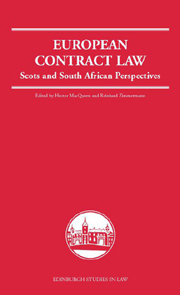Book contents
- Frontmatter
- Contents
- Preface
- List of Contributors
- List of Abbreviations
- 1 Ius Commune and the Principles of European Contract Law: Contemporary Renewal of an Old Idea
- 2 Good Faith
- 3 Offer, Acceptance, and the Moment of Contract Formation
- 4 The Battle of Forms
- 5 Agency
- 6 Threats and Excessive Benefits or Unfair Advantage
- 7 Interpretation
- 8 Third-Party Contracts
- 9 Payment
- 10 Specific Performance and Special Damages
- 11 Termination for Breach of Contract
- 12 Assignment
- 13 Capitalisation of Interest
- Appendix: The Principles of European Contract Law
- List of Cases
- Index
3 - Offer, Acceptance, and the Moment of Contract Formation
Published online by Cambridge University Press: 05 July 2013
- Frontmatter
- Contents
- Preface
- List of Contributors
- List of Abbreviations
- 1 Ius Commune and the Principles of European Contract Law: Contemporary Renewal of an Old Idea
- 2 Good Faith
- 3 Offer, Acceptance, and the Moment of Contract Formation
- 4 The Battle of Forms
- 5 Agency
- 6 Threats and Excessive Benefits or Unfair Advantage
- 7 Interpretation
- 8 Third-Party Contracts
- 9 Payment
- 10 Specific Performance and Special Damages
- 11 Termination for Breach of Contract
- 12 Assignment
- 13 Capitalisation of Interest
- Appendix: The Principles of European Contract Law
- List of Cases
- Index
Summary
INTRODUCTION
It was the Natural lawyers of the seventeenth century, especially in France, who developed the concept of consensus as the basis of modern contract law. Roman-Dutch authorities embraced this notion and further accepted that consensus can be analysed in terms of two declarations of will, i.e. offer and acceptance. These Civilian concepts also had a profound influence on the development of contract law in the Common Law. In England, especially, Pothier's writings on the subject became influential and resulted in the adoption of the offer and acceptance analysis. English jurists in turn further developed and refined offer and acceptance to a model of contract formation.
The offer and acceptance model is a standard feature of modern contract law in South Africa and Scotland. Typically of both these mixed legal systems, the model was received from Civilian sources, but has been significantly influenced by the Common Law. As such, the offer and acceptance model presents an interesting subject matter for a comparative analysis of the newly formulated PECL viewed against the mixed legal systems of South Africa and Scotland. The focus in this paper is specifically on that aspect of the Scots and South African model that represents the most evident Common Law influence, namely the rules pertaining to inter absentes contracting and specifically the so-called postal rule. The goal of the analysis is on the one hand to determine to what extent PECL can be likened to mixed legal systems such as South Africa and Scotland.
- Type
- Chapter
- Information
- European Contract LawScots and South African Perspectives, pp. 74 - 97Publisher: Edinburgh University PressPrint publication year: 2006



